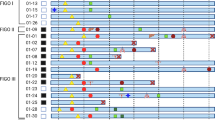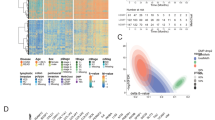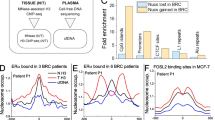Abstract
Invasive ductal carcinoma of the breast is the most common cancer affecting women worldwide. The marked heterogeneity of breast cancer is matched only with the heterogeneity in its associated or causative factors. Breast cancer in Saudi Arabia is apparently an early onset with many of the affected females diagnosed before they reach the age of 50 years. One possible rationale underlying this observation is that consanguinity, which is widely spread in the Saudi community, is causing the accumulation of yet undetermined cancer susceptibility mutations. Another factor could be the accumulation of epigenetic aberrations caused by the shift toward a Western-like lifestyle in the past two decades. In order to shed some light into the molecular mechanisms underlying breast cancer in the Saudi community, we identified KLOTHO (KL) as a tumor-specific methylated gene using genome-wide methylation analysis of primary breast tumors utilizing the MBD-seq approach. KL methylation was frequent as it was detected in 55.3 % of breast cancer cases from Saudi Arabia (n = 179) using MethyLight assay. Furthermore, KL is downregulated in breast tumors with its expression induced following treatment with 5-azacytidine. The involvement of KL in breast cancer led us to investigate its relationship in the context of breast cancer, with one of the protagonists of its function, fibroblast growth factor receptor 4 (FGFR4). Overexpression of FGFR4 in breast cancer is frequent in our cohort and this overexpression is associated with poor overall survival. Interestingly, FGFR4 expression is higher in the absence of KL methylation and lower when KL is methylated and presumably silenced, which is suggestive of an intricate relationship between the two factors. In conclusion, our findings further implicate “metabolic” genes or pathways in breast cancer that are disrupted by epigenetic mechanisms and could provide new avenues for understanding this disease in a new context.






Similar content being viewed by others
References
Forouzanfar MH, Foreman KJ, Delossantos AM, Lozano R, Lopez AD, Murray CJ, et al. Breast and cervical cancer in 187 countries between 1980 and 2010: a systematic analysis. Lancet. 2011;378:1461–84.
Mehmood A, Te OB, Urcia JC, Khan A. Tumor registry annual report. Saudi Arabia: King Faisal Specialist Hospital & Research Center; 2011.
Najjar H, Easson A. Age at diagnosis of breast cancer in Arab nations. Int J Surg. 2010;8:448–52.
CRUK. Cancerstats. UK: Cancer Research UK; 2014. http://www.cancerresearchuk.org/health-professional/cancer-statistics, Accessed March 2014.
Merdad A, Gari MA, Hussein S, Al-Khayat S, Tashkandi H, Al-Maghrabi J, et al. Characterization of familial breast cancer in Saudi Arabia. BMC Genomics. 2015;16:S3.
Buhmeida A, Dallol A, Merdad A, Al-Maghrabi J, Gari MA, Abu-Elmagd MM, et al. High fibroblast growth factor 19 (fgf19) expression predicts worse prognosis in invasive ductal carcinoma of breast. Tumor Biol. 2014;35:2817–24.
Kuro-o M. Klotho in health and disease. Curr Opin Nephrol Hypertens. 2012;21:362–8.
Masuda H, Chikuda H, Suga T, Kawaguchi H, Kuro-o M. Regulation of multiple ageing-like phenotypes by inducible klotho gene expression in klotho mutant mice. Mech Ageing Dev. 2005;126:1274–83.
Xu Y, Sun Z. Molecular basis of klotho: from gene to function in aging. Endocr Rev. 2015;36:174–93.
Kurosu H, Ogawa Y, Miyoshi M, Yamamoto M, Nandi A, Rosenblatt KP, et al. Regulation of fibroblast growth factor-23 signaling by klotho. J Biol Chem. 2006;281:6120–3.
Wolf I, Levanon-Cohen S, Bose S, Ligumsky H, Sredni B, Kanety H, et al. Klotho: a tumor suppressor and a modulator of the igf-1 and fgf pathways in human breast cancer. Oncogene. 2008;27:7094–105.
Kuro-o M. Klotho as a regulator of oxidative stress and senescence. Biol Chem. 2008;389:233–41.
Ravikumar P, Ye J, Zhang J, Pinch SN, Hu MC, Kuro-o M, et al. Alpha-klotho protects against oxidative damage in pulmonary epithelia. Am J Physiol Lung Cell Mol Physiol. 2014;307:L566–75.
Chen CD, Li H, Liang J, Hixson K, Zeldich E, Abraham CR. The anti-aging and tumor suppressor protein klotho enhances differentiation of a human oligodendrocytic hybrid cell line. J Mol Neurosci. 2015;55:76–90.
Lee J, Jeong DJ, Kim J, Lee S, Park JH, Chang B, et al. The anti-aging gene klotho is a novel target for epigenetic silencing in human cervical carcinoma. Mol Cancer. 2010;9:109.
Pan J, Zhong J, Gan LH, Chen SJ, Jin HC, Wang X, et al. Klotho, an anti-senescence related gene, is frequently inactivated through promoter hypermethylation in colorectal cancer. Tumour Biol. 2011;32:729–35.
Qu Y, Dang S, Hou P. Gene methylation in gastric cancer. Clin Chim Acta. 2013;424:53–65.
Rubinek T, Shulman M, Israeli S, Bose S, Avraham A, Zundelevich A, et al. Epigenetic silencing of the tumor suppressor klotho in human breast cancer. Breast Cancer Res Treat. 2012;133:649–57.
Wang L, Wang X, Wang X, Jie P, Lu H, Zhang S, et al. Klotho is silenced through promoter hypermethylation in gastric cancer. Am J Cancer Res. 2011;1:111–9.
Xie B, Zhou J, Yuan L, Ren F, Liu DC, Li Q, et al. Epigenetic silencing of klotho expression correlates with poor prognosis of human hepatocellular carcinoma. Hum Pathol. 2013;44:795–801.
Martin A, David V, Quarles LD. Regulation and function of the fgf23/klotho endocrine pathways. Physiol Rev. 2012;92:131–55.
Urakawa I, Yamazaki Y, Shimada T, Iijima K, Hasegawa H, Okawa K, et al. Klotho converts canonical fgf receptor into a specific receptor for fgf23. Nature. 2006;444:770–4.
Liu R, Li J, Xie K, Zhang T, Lei Y, Chen Y, et al. Fgfr4 promotes stroma-induced epithelial-to-mesenchymal transition in colorectal cancer. Cancer Res. 2013;73:5926–35.
Luo Y, Yang C, Ye M, Jin C, Abbruzzese JL, Lee MH, et al. Deficiency of metabolic regulator fgfr4 delays breast cancer progression through systemic and microenvironmental metabolic alterations. Cancer Metab. 2013;1:21.
Marme F, Werft W, Benner A, Burwinkel B, Sinn P, Sohn C, et al. Fgfr4 arg388 genotype is associated with pathological complete response to neoadjuvant chemotherapy for primary breast cancer. Ann Oncol. 2010;21:1636–42.
Xu B, Tong N, Chen SQ, Hua LX, Wang ZJ, Zhang ZD, et al. Fgfr4 gly388arg polymorphism contributes to prostate cancer development and progression: a meta-analysis of 2618 cases and 2305 controls. BMC Cancer. 2011;11:84.
Zhang Y, Liu T, Meyer CA, Eeckhoute J, Johnson DS, Bernstein BE, et al. Model-based analysis of chip-seq (macs). Genome Biol. 2008;9:R137.
Salmon-Divon M, Dvinge H, Tammoja K, Bertone P. PeakAnalyzer: genome-wide annotation of chromatin binding and modification loci. BMC Bioinformatics. 2010;11:415.
Robinson JT, Thorvaldsdottir H, Winckler W, Guttman M, Lander ES, Getz G, et al. Integrative genomics viewer. Nat Biotechnol. 2011;29:24–6.
Dallol A, Al-Ali W, Al-Shaibani A, Al-Mulla F. Analysis of DNA methylation in ffpe tissues using the MethyLight technology. Methods Mol Biol. 2011;724:191–204.
Abu-Elmagd M, Ishii Y, Cheung M, Rex M, Le Rouedec D, Scotting PJ. Csox3 expression and neurogenesis in the epibranchial placodes. Dev Biol. 2001;237:258–69.
Acknowledgments
The authors would like thank the Ministry of Education and King Abdulaziz City for Science and Technology (KACST) for their financial support to this research project (ARP-29-292).
Conflicts of interest
None
Author information
Authors and Affiliations
Corresponding author
Rights and permissions
About this article
Cite this article
Dallol, A., Buhmeida, A., Merdad, A. et al. Frequent methylation of the KLOTHO gene and overexpression of the FGFR4 receptor in invasive ductal carcinoma of the breast. Tumor Biol. 36, 9677–9683 (2015). https://doi.org/10.1007/s13277-015-3733-3
Received:
Accepted:
Published:
Issue Date:
DOI: https://doi.org/10.1007/s13277-015-3733-3




